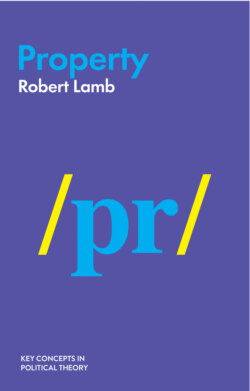Property

Реклама. ООО «ЛитРес», ИНН: 7719571260.
Оглавление
Robert Lamb A.. Property
Contents
Guide
Pages
Series title. Key Concepts in Political Theory
Property
Copyright page
Dedication
Acknowledgements
Introduction: What is Property?
Contesting concepts
An historical approach to the concept of property
Structure of the book
Notes
1 The Case against Private Property
Jean-Jacques Rousseau
Proudhon and the anarchist case against property
Socialism and the idea of life without private ownership
Conclusion
Notes
2 Libertarianism and the Natural Right to Property
The inviolability of property rights
Property and freedom
The concept of self-ownership
The legacy of Locke
Notes
3 Natural Law and the Gnarled Roots of Self-Ownership
The role of theology in natural law theories of property
Back to Nozick
Redistributive libertarianism
Conclusion
Notes
4 Property for the Greater Good: Utilitarian Theories of Ownership
Utilitarianism as normative political theory
Hume and the emergence of property
The utilitarianisms of Jeremy Bentham and John Stuart Mill
Evaluating the utilitarian theories of property
Conclusion
Notes
5 Ownership as Will in the World: Hegel’s Account of Property
Property as freedom
Moments of ownership
Property and poverty: the problem of ‘the rabble’
Conclusion
Notes
6 Property within Justice: Rawls and Beyond
Rawls on the right to private property
Property and distributive justice
Property-owning democracy and the concept of predistribution
Conclusion
Notes
Conclusion
Bibliography
Index
POLITY END USER LICENSE AGREEMENT
Отрывок из книги
Robert Lamb
Much of what I have learned about property over the years has come from conversations with other scholars. Many of these conversations were at stimulating workshops organised by Chris Pierson, through the Political Studies Association’s ‘Politics of Property’ specialist group that he led so brilliantly. The comments I received on the manuscript from the three anonymous referees (and from three others on the original proposal) were very useful, including objections from one overwrought libertarian critic, which helped persuade me that I was on broadly the right track. Ross Carroll provided valuable comments on the text towards the very end of its composition and I benefited from the excellent copy-editing of Tim Clark. While writing a book that is essentially an introduction to its subject, I have had in mind the two teachers who first introduced me to political philosophy as an undergraduate – Gabriella Slomp and Kevin Francis – with such infectious passion and enthusiasm. Most importantly, as well as providing her typically piercing thoughts on the manuscript, Sarah Drews Lucas helped keep me loved (and sane) as the last years have flown by. This book is dedicated to our son, who was born this week, amidst a global pandemic.
.....
The most influential way of thinking about property in contemporary legal philosophy instead abandons altogether the view of it as a singular concept, and understands it instead to be a ‘bundle’ of discrete and separable legal relations. There have been different ways of conceiving exactly what such a bundle entails, but the basic idea is that we can endeavour to separate the various sticks that comprise it and, in so doing, acquire a better understanding of the nature of the legal and social phenomena at issue. Proponents of the bundle approach claim that it clears away what they regard as a fog of conflation that blinds political and legal discussion of the subject. To appreciate the thinking behind the bundle theory, we need to step back a bit and go over some of the key features of rights themselves. Beyond their expressive, political purposes – which might include the recognition of our dignity or moral standing in a community – rights serve to enable and prohibit our freedoms, making some actions permissible and others impermissible. In the context of property, this function seems straightforward and relates back to our interest in having systematic and permanent protection for specific resources, which become our holdings rather than those of anyone else.
Perhaps even more fundamental to the understanding of rights is their relational nature. Rights delineate realms of permissible action between individuals and therefore make sense only in a social context: we hold rights against others. Property rights govern relations between persons (and corporations) rather than between persons (and corporations) and specific things. In a world with only one person (but lots of things) the idea of property rights would presumably be superfluous because the relevant relational context would not exist: there would be no other individual against whom to hold rights. This aspect of rights can help us be wary of some of the confusing language that we are prone to use when talking about ownership. We might talk of the right I have over my magnifying glass, but it is a mistake to believe that this right is somehow held against the inanimate object, rather than against the other agents within my socio-legal sphere.
.....